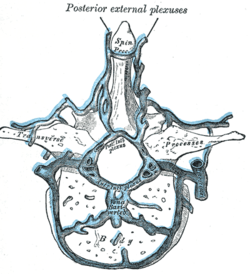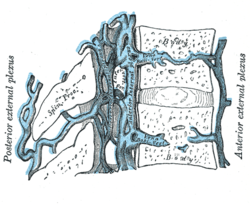This article or section appears to contradict itself on Last's Anatomy states: "The internal vertebral plexus sends its efferent veins (the intervertebral veins) [...] to drain into the external vertebral venous plexus and thence into the segmental veins." This seems to contradict the content referencing Gray's Anatomy.. (August 2023) |
The intervertebral veins accompany the spinal nerves through the intervertebral foramina to drain the internal vertebral venous plexuses into the external vertebral venous plexuses.[1] They drain (in craniocaudal sequence) into vertebral vein, intercostal veins, lumbar veins, and lateral sacral veins. Upper posterior intercostal veins may additionally drain via brachiocephalic vens. They may drain to ascending lumbar veins. They may drain into the inferior vena cava directly, reaching it by winding around the surface of the vertebral body.[2]
| Intervertebral veins | |
|---|---|
 Transverse section of a thoracic vertebra, showing the vertebral venous plexuses. | |
 Median sagittal section of two thoracic vertebrae, showing the vertebral venous plexuses. | |
| Details | |
| Identifiers | |
| Latin | vena intervertebralis |
| Anatomical terminology | |
It is unclear whether intervertebral veins contain functional venous valves; blood flow through intervertebral veins may be reversible, suggesting a possible mechanism for metastatic spread of e.g. prostatic cancer to the spine during temporary blood flow reversals (e.g. during periods of elevated intra-abdominal pressure or during postural alterations).[2]
Anatomy
editFate
editTheir drainage depends upon the part of the body:
References
edit- ^ Sinnatamby, Chummy S. (2011). Last's Anatomy (12th ed.). p. 453. ISBN 978-0-7295-3752-0.
- ^ a b Standring, Susan (2020). Gray's Anatomy: The Anatomical Basis of Clinical Practice (42nd ed.). New York. p. 882. ISBN 978-0-7020-7707-4. OCLC 1201341621.
{{cite book}}: CS1 maint: location missing publisher (link)